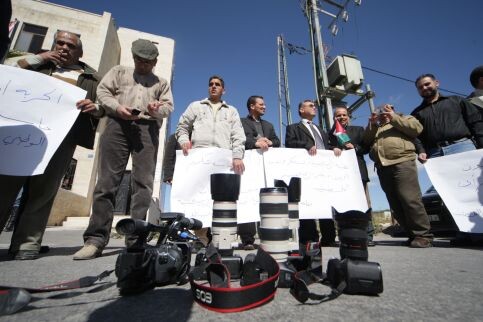The Electronic Intifada 26 July 2010

Palestinian journalists protest in Bethlehem, occupied West Bank after they were prevented by Palestinian Authority forces from covering a demonstration. (Luay Sababa/MaanImages)
The split between the the Hamas-run Gaza wing and the Fatah-run West Bank wing of the Palestinian Authority (PA) has overshadowed every aspect of public life, including, many rights groups have documented, infringements on press freedoms and the work of journalists.
Eighteen months ago, Samir Hamato, 42, Gaza-based economics editor with the Palestinian newspaper of al-Hayat al-Jadida had his monthly salary withheld by the West Bank PA. Hamato told The Electronic Intifada that he has yet to learn the reasons.
“I do not know why did this to me,” Hamato said. “I do recall that I had some work problems with a colleague of mine, who is believed to be linked with Fatah. A few weeks after I quarreled with him, I wanted to take my salary but I was surprised to find it withheld.”
Hamato, a father of seven children, also takes care of his parents. He told The Electronic Intifada that for the last year and a half, he has worked for some other media outlets, but it has brought him insufficient income to meet his needs.
“Many times, I received positive promises that my problem would be sorted out this month, or next month and so on with no concrete result,” Hamato said. “Three months ago, the journalists’ syndicate intervened with the government and security services in Ramallah, and they have received positive promises, yet there is no concrete progress.”
Al-Hayat al-Jadida newspaper, where Hamato worked, is run by the West Bank Palestinian Authority, but it now no longer circulates in Gaza due to what the West Bank PA says is a ban by the Hamas-run Gaza PA.
“Right after the Hamas’ takeover of Gaza in June 2007, the Palestinian Authority in Ramallah demanded employees of all PA-linked media institutions to leave their workplaces. We in the information ministry responded by inviting those workers to return but so far they have not complied,” Salama Marouf, chief of press services in the Gaza information ministry, told The Electronic Intifada.
Asked whether the Hamas-led media services have prevented printing or circulation any publications, including al-Hayat al-Jadida, Marouf responded:
“We have not been yet officially informed of the Israeli occupation’s decision to allow entry of local newspapers like the al-Hayat Al-Jadida newspaper. Unfortunately, [West Bank] PA officials have always claimed that Hamas has been preventing circulation of those newspapers. Suppose this is correct, Israel has only recently announced allowing entry of copies of those papers into Gaza.”
Marouf also spoke of a Hamas-supported initiative to protect press freedoms under which the West Bank PA would allow Hamas-linked media outlets as al-Aqsa TV and radio and al-Risala newspaper to operate and circulate in the West Bank and in return the Hamas-led authorities would allow freedom of work in Gaza to the Fatah-linked Palestine TV and other media outlets.
Ghassan al-Khatib, director of the West Bank PA press office in Ramallah, said he was unaware of this initiative. In a phone interview with The Electronic Intifada, al-Khatib said he did not know the specifics about Hamato’s case but said in general, “if this person’s relation with anybody proves to be legal and away from involvement in illegal procurement of weapons or money, then there would be no need to withhold his salary.”
Mada, a West-Bank based nongovernmental organization for press freedoms, has documented several cases of journalists who have been harassed or denied their right to travel outside of Gaza.
“We would like to send out a message to both governments in Ramallah and Gaza that they both should respect the rule of law regarding the work of media in the territories, so we call for more public freedoms as well as end of the division swiftly, so that journalists being victimized because of the separation between Gaza and the West Bank,” said Karem Neshwan, legal advisor for Mada in Gaza.
Saher al-Aqra, a Gaza-based journalist linked with the Fatah party of Western-supported PA leader Mahmoud Abbas, told The Electronic Intifada that he has been harassed by Hamas-affiliated security personnel. Two weeks ago, he wanted to pursue postgraduate media studies in Egypt but was denied exit through the Rafah crossing terminal.
“When I arrived at the terminal, some men, not wearing uniforms, stopped me and turned me back, seizing my passport and ID cards,” al-Aqra said. “One of them tore up my ID card, saying to me that I am one of the collaborator mercenaries who belong to the mercenary Mahmoud Abbas of the Dayton government and therefore I am not allowed to travel.” General Keith Dayton, is an American general appointed by the US government to train military units and security forces loyal to Abbas. This force have been used in a widespread, ongoing crackdown against Hamas and those suspected of affiliation with it in the West Bank.
Salama Marouf, of the Hamas-run information ministry in Gaza challenged al-Aqra’s account of what happened and said that the latter did not work for a specific publication and could not show credentials or the permission to travel from an employer that a prospective traveler normally obtains.
While such tit-for-tat allegations are difficult to sort out, what seems clear is that as long as the split between the two wings of the PA and the Hamas and Fatah movements remains, the press and media will be one of the arenas which remains a victim of the disunity.
Rami Almeghari is a journalist and university lecturer based in the Gaza Strip.




